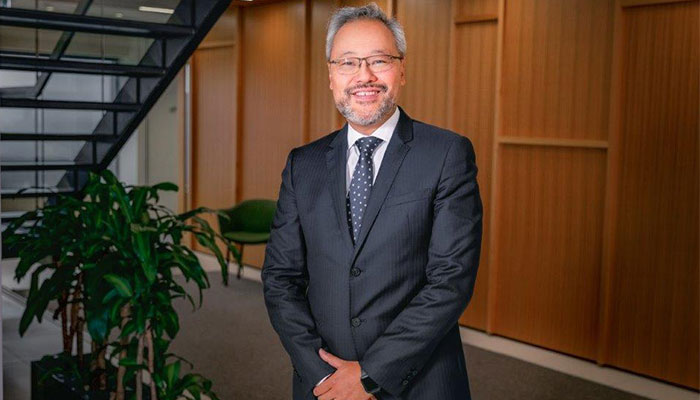Oncologists may soon have a new weapon in the arsenal against cancer, with mRNA vaccines joining the existing battery of treatments.

Developed by international biotech company Moderna, the vaccine V940 is being trialled on kidney cancer at four clinical sites in Australia, including Macquarie University Hospital (MUH).
mRNA vaccines do not work directly on the disease but stimulate the body’s own immune cells to destroy the cancer.
The ‘vaccine’ is not like the vaccines commonly used to prevent viral infections such as COVID-19 or influenza.
The technology replicates abnormal proteins produced by an individual’s cancer, which are then injected into that person. Their immune system identifies these proteins as foreign, then gears up to attack any cancer cells that might be still in the body after surgery.
Professor Howard Gurney, Macquarie University’s Director of Clinical Trials and Head of its Cancer Program, says most kidney and bladder cancers are small tumours with a low risk of recurring once they have been removed and don’t require any further treatment.
“Cancer falls into the high-risk category if it is larger than 10 centimetres when diagnosed, has invaded nearby lymph nodes, or appear aggressive under the microscope,” he says.
“These features make it more likely to metastasise and take hold elsewhere in the body, such as the lung, bone, liver and brain. These may be present in microscopic amounts at the time of surgery and are therefore undetected even with the most sensitive scans.
“About half of all patients with high-risk kidney cancer relapse, and the more of these bad risk factors they have, the more likely it becomes.”
About 3000 new cases of kidney cancer and 3100 cases of bladder cancer are diagnosed each year. In 2022, 912 people died from kidney cancer and 1061 from bladder cancer in 2023. Both diseases are most common in people over the age of 55, with men more likely to be diagnosed than women.
Unlike the COVID-19 mRNA vaccines, each patient’s vaccine is unique to them.
A sample of the person’s tumour is sent away to the lab and used to develop a personalised therapy, a process that takes about eight weeks. It is then delivered as an infusion every three weeks for up to a year.
A two-pronged attack on cancer
The Macquarie University Clinical Trials Unit has become known as a centre of excellence in the clinical trials sector.
It carries out about 160 in-human trials a year, many of which are world-firsts run on behalf of pharmaceutical and biomedical companies or Australian cancer clinical trials groups. A number of these are run across multiple sites worldwide.
The V940 kidney cancer vaccine trial builds on a previous study that showed an immunotherapy treatment, pembrolizumab, was effective both in reducing the recurrence of high-risk kidney cancers and improving patients’ overall survival rate.
Thirteen MUH patients were part of a worldwide cohort of 994 who took part in the double-blind, randomised trial It was spread across nearly 40 sites, just two of which were in Australia.
Pembrolizumab is an established immunotherapy used to treat many advanced cancers including malignant melanoma, lung cancer, urothelial cancer and head and neck cancers.
Like the mRNA vaccine, it has also been used as an adjuvant treatment, which is given following surgery and to patients with various cancers who have a high risk of recurrence. For the trial, it was administered as an infusion every three weeks for up to 12 months.
Clinicians hope pembrolizumab will be added to the Pharmaceutical Benefits Scheme in coming months for use on kidney, bladder and urothelial cancers, paving the way for it to become the standard treatment in combination with surgery.
Patients on the V940 trial are also receiving pembrolizumab. The control group will receive it on its own, and the trial group will receive it in combination with the vaccine to test whether the two together will prove even more effective than the immunotherapy alone.
Another V940 trial has also commenced at Macquarie University using the vaccine to prevent recurrence in bladder cancer patients after surgery.

Professor Howard Gurney, pictured, is Director of Clinical Trials and Head of the Cancer Program at the Macquarie University Faculty of Medical and Health Sciences.



